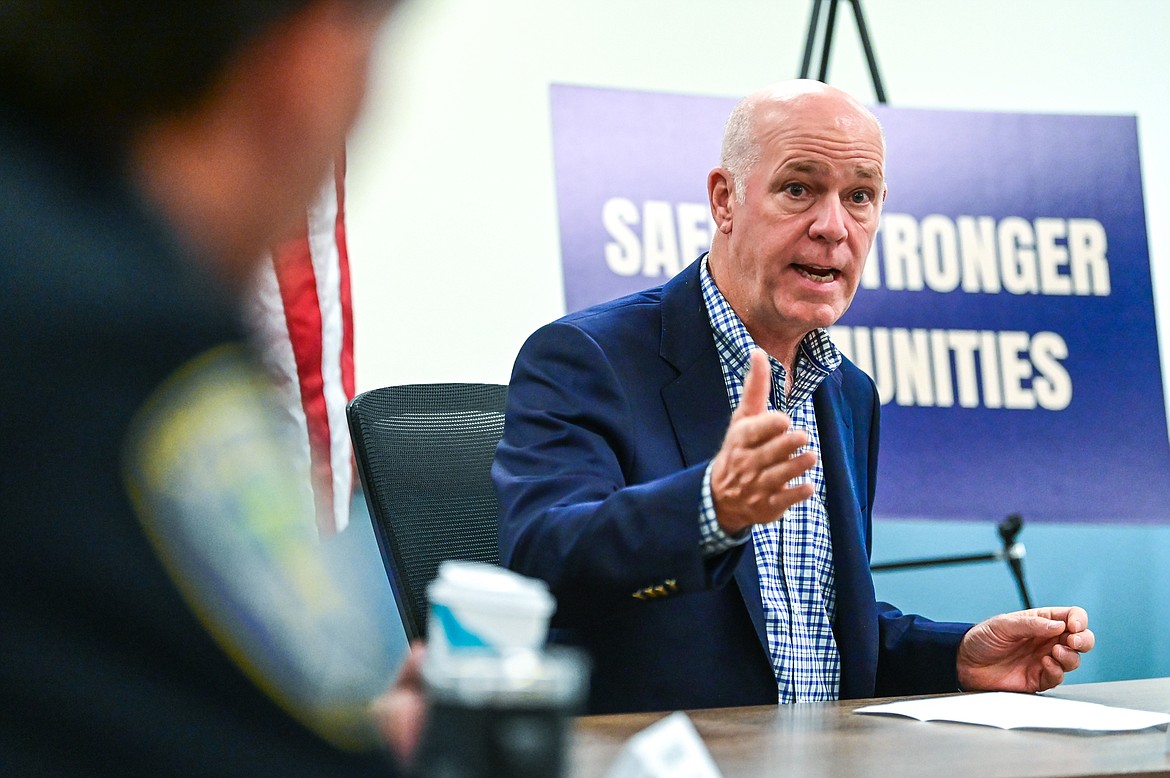Local leaders pitch Gianforte on ways to combat drugs in the valley
Local elected leaders, law enforcement officials and addiction specialists presented Gov. Greg Gianforte with a portrait of a rapidly growing community struggling with worsening drug and mental health issues during a roundtable discussion on Thursday.
Gianforte, who held similar gatherings in Billings, Butte, Great Falls and Missoula, said he sought an understanding of the situation in Flathead County and suggestions for how the state could help. The roundtable, held in a county conference room in downtown Kalispell, came after the state Department of Justice announced in August seizing 111,611 doses of fentanyl in the first half of 2022, up from 60,557 in all of the year prior and 6,663 in 2020.
Attorney General Austin Knudsen issued a press release announcing his joining with 17 of his colleagues in calling on President Joe Biden to deem fentanyl a weapon of mass destruction about 20 minutes prior to the kickoff of the discussion in Kalispell.
Sheriff Brian Heino told Gianforte that his office was seeing service calls increase — likely as a result of population growth — when drugs began to play a more prominent role in crimes in the valley. He said fentanyl has increasingly overtaken methamphetamine as a drug of choice, locally.
“Law enforcement has more calls with an increase in violence or thefts directly related to the purchase of narcotics,” Heino told the governor.
County Attorney Travis Ahner estimated about 70% of his office’s cases involved drugs. Addiction goes beyond drug crimes, he said, fueling thefts, burglaries and human trafficking in the region.
Kalispell Police Chief Doug Overman echoed Heino and highlighted the two major calls his department dealt with as he headed to the meeting that morning: An apparently bloodied woman running through a fast food restaurant and a hotel guest screaming about bugs in her hair.
"Both are indicative of drug use or some kind of violence,” he said. “It really is a characterization of what we see typically.”
Overman also emphasized mental health issues in the community, describing it as going hat in hand with drug use, and alluded to hiring difficulties owing to the “national narrative” surrounding law enforcement.
"There has been a real marginalization of law enforcement, of public service in general,” he said. “ … If you’re a young person — 20 or 21 — and you’re looking at the national narrative surrounding law enforcement, are you still interested in the career?”
Those in the field of addiction treatment emphasized taking a holistic approach to addiction. At this point, said Kat and Chad Kingery of Alpenglow Clinic in Kalispell, addiction is a generational problem in the county. Kat Kingery described her clients as “humans who never learned how to human effectively.”
“They don’t know how to manage emotions, how to keep a job or how to discipline their children,” she said. “They don’t have a sense of self identity — they don’t know who they are.”
Overwhelmed, an addict turns to external solutions, she said.
Chad Kingery said the couple’s years of experience in treatment had exposed them to gaps in the system. They have found pushback from school districts when they proposed educational and prevention courses. No school wants to be associated with a drug problem, he told Gianforte, even though officials often know their students are engaging in risky behavior.
Chad Kingery also cited the need for transitional stepping stones from inpatient treatment and took aim at the legalization of recreational marijuana and what he described as lax driving under the influence laws. The Kingerys’ daughter, Madelyn Mishleau, was struck and grievously injured by an allegedly drunk driver in April.
“The punitive nature of some of the things that are a direct result of drug and alcohol use needs to be tightened up,” Chad Kingery said, calling for drunk driving to reach the level of a felony after one or two convictions.
TOUGHER LAWS — and a tougher approach to repeat offenders — were among the ideas pitched to Gianforte after he solicited suggestions.
Ahner said moves the state Legislature made to cut costs ended up decreasing penalties for misdemeanors and limiting local authorities’ ability to intervene early.
"A lack of accountability at those early steps and those folks graduate,” he said. “They start in our city court and justice court and it doesn’t take very long before you’re on [to district court].”
Changes to probation and parole policy in 2017 also hinders authorities, he said. Previously, supervising officers could intervene earlier with an individual falling back into old habits, Ahner said.
"Now you have to wait until you’re in crisis mode,” he said.
Overman, who said his sister died of an overdose about a decade ago, echoed calls for more accountability.
"Accountability is compassion,” he said. “Sometimes, it’s life saving.”
Heino asked for youth and educational programs. With fentanyl, the sheriff said, the education is pretty straight forward: “Hey, fentanyl is going to kill you.”
He also asked for Gianforte’s help with the U.S. Postal Service, which plays a role in the delivery of illegal drugs in the Flathead Valley.
“The mail is killing us. We had a Nerf gun that was loaded with fentanyl one day,” Heino said. “Our mail system is bringing in drugs and narcotics and it’s killing us.”
Lori Madden, director of the Flathead Youth Home Program, called for preventative measures. That includes addressing mental health problems early on, she said.
Chad and Kat Kingery asked for the state to open up funding to for-profit treatment facilities. Investing in bigger and better facilities has become cost-prohibitive as the value of land increases, Chad Kingery said.
Several of the assembled group pointed to the bottom line. Local agencies need help with funding, said Kalispell Mayor Mark Johnson.
“We’re woefully behind in Montana in ways to generate tax money,” Johnson told Gianforte, saying that many taxpayers he spoke with expressed willingness to fund law enforcement.
“Everything has a cost, how do you want to pay it?” asked Overman.
GIANFORTE, BETWEEN jotting down suggestions, highlighted his administration’s approach to drugs and crime in the state. That strategy includes the Angel Initiative, which aims at helping authorities connect addicts with treatment facilities.
“We’d love to get Flathead County signed up on [it],” he said, pointing out that 22 other counties had partnered with the state Department of Health and Human Services on the initiative.
He also pointed to the Healing and Ending Addiction Through Recovery and Treatment (HEART) Fund as an accomplishment, touting it as the largest new expenditure in the state’s budget. The money, Gianforte said, reinforces community groups, nonprofits and churches working in the trenches.
Gianforte said his staff was examining existing programs to determine which were effective and figure out ways to bolster those while culling initiatives with lackluster results. Intervening early and successfully made fiscal sense as well, he said.
“Parents end up in prison, their kids end up in foster care — that’s way more expensive than going upstream and investing in the families,” Gianforte said.
But he was quick to argue that the role of government was not to save people from themselves, highlighting the Office of Faith and Community Based Services, under the umbrella of DPPHS, as one way Helena could back up nonprofits.
Ki-Ai McBride of DPPHS’ opioid prevention program, who joined the governor at the roundtable, announced an upcoming effort she called the opioid education and naloxone distribution program to run alongside the Angel Initiative. While the state department has increasingly upped the amount of Narcan and naloxone — medication that reverses opioid overdoses — officials recognize they need to help addicts not just survive active addiction, but find success in recovery.
“We’re supporting law enforcement in being a safe harbor and supporting people making it to treatment,” she told the group.
News Editor Derrick Perkins can be reached at 758-4430 or dperkins@dailyinterlake.com.




















